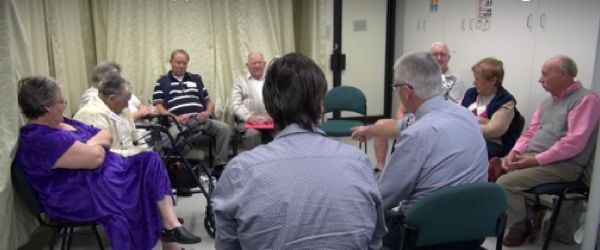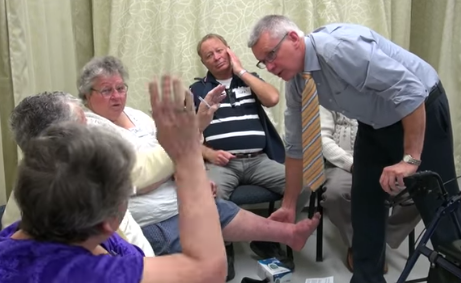
The doctor will see you ALL now
The Australasian Society of Lifestyle Medicine (ASLM) has been pioneering Shared Medical Appointments (SMAs) in Australasia for some years, including conducting pilot trials and advocating for the concept to be recognised within the current Medicare reimbursement system.
Also known as ‘Group Visits’ or ‘Drop in Group Medical Appointments’ in the US, an SMA is, “A series of consecutive individual medical consultations in a supportive group setting where all can listen, interact, and learn.” As such an SMA is a both an individual consultation and a group education session.
There are numerous studies into the SMA model around the world, consistently pointing to improved patient outcomes, increased practitioner and patient satisfaction, and overall cost and resource effectiveness, but only a handful of studies in Australia to date.
Traditionally, medical consultations have been carried out in a 1:1 situation; an ‘expert’ (doctor) consulting with one patient. This has served us well, and still does with injuries and infectious diseases. But the rise in chronic diseases with the modernisation of society has dramatically altered the clinical landscape.
No longer is a pharmaceutical prescription, a doctor’s advice, or surgery, sufficient or necessarily appropriate to manage what can amount to complex, lifetime, metabolic, cardiovascular, respiratory or carcinogenic disorders.
In the past, attempts have been made to address this by the development of education sessions (e.g.: diabetes education), usually involving one health ‘expert’ and a patient group of say, 10-20 people. But group education lacks medical input and the 1:1 consultation lacks an education component. Hence another model was still needed.

The minimal ‘team’ for an SMA is a doctor and a trained facilitator. In an SMA, the doctor carries out his/her doctoring, but with other patients watching. The facilitator introduces the group, writes records and questions on a board, assists the doctor with information, controls the group dynamics, and in some cases writes the medical records.
Other personnel can include a documenter (to keep medical records), a Practice Nurse (for carrying out pre-group observations) or other allied health professionals according to the group needs and financial availability.
Importantly, ASLM has developed an SMA Protocol, provides training for doctors and potential facilitators, and a system of ongoing review and peer support for those delivering Shared Medical Appointments.
Billing however, is not yet clear with lack of clarification from Medicare as to whether individual consultations held in the presence of others can be billed under an Item 23, yet an SMA is even less suited to group education item numbers given that a series of consultation takes place in the session. Despite this uncertainty, uptake of SMAs is gaining pace with numerous medical centres requesting training and putting SMAs into practice in their clinics.
Finally, it’s worth noting that with the advent of the government’s ‘Health Care Home’ trial, the system of Medicare reimbursement is clearly under review, and likely to move towards a system which rewards doctors and their practices for proactively managing chronic disease and improving health and wellbeing in their patient populations. Subject to any future model not further disadvantaging doctors, such as been happening with the current Medicare rebate freeze, ASLM cautiously welcomes this direction.
The SMA is ideally suited to be the mainstay of the Health Care Home. It represents a quantum leap forward in chronic disease management and a step towards a more modern, effective health care system.
Doctors, practice managers and stakeholders wanting to hold SMA facilitator training in their practice or Primary Health Network should get in touch with ASLM. Feedback from a recent SMA training workshop is shown below.
Links to journal articles, media, videos and resources can be found here.
Watch a video of an SMA in action here.
For more information, contact ASLM:
Feedback from an SMA training workshop
Below is a testimonial from Dr Kean-Seng Lim, a GP who recently held an SMA training workshop in his practice.
“Thanks to Profs Garry Egger and John Stevens for the presentation. The feedback from participants was universally excellent.
Garry’s primer on Lifestyle Medicine, ‘metaflamation’ and consideration of proximal and distal causality was an excellent opening and provoked a lot of interest in the ASLM. I think the participant comment about not needing to sell the SMA process after that was quite apt, in that the need for this modality was quite clear.
The rest of the session was a good mix of practice and discussion of processes and applications. I got the sense from one participant that she would have liked more discussion on practical implementation, but in truth this is going to be different on a practice-by-practice basis. Perhaps one improvement may have been to take a deeper dive into some specific applications on the whiteboard.
There would probably be utility in having follow up discussions on practical implementation, and we will be doing this within our small group of practices.
[Editor’s note: ASLM is also introducing a system of ongoing review and peer support for those delivering Shared Medical Appointments via it’s online learning management system.]
It’s interesting to consider that one potential business application for SMAs could actually be allied health practitioners organising and facilitating the sessions for doctors.
Perhaps the best measure of the success of the workshop was the spontaneous ideas it generated after the event. Five days later, there is still a buzz about what we can do with SMAs and how we can use them for our practice population.
To me, this is an indicator of how it can also help to build team morale and cohesion within our practice team (building block 3 in the Bodenheimer principles of high performing medical homes).
In summary, we consider the SMA training to have been a very worthwhile exercise, adding another tool to the way we can do things. I am quite serious in saying that we intend to have world leading health outcomes in our practice population.”



